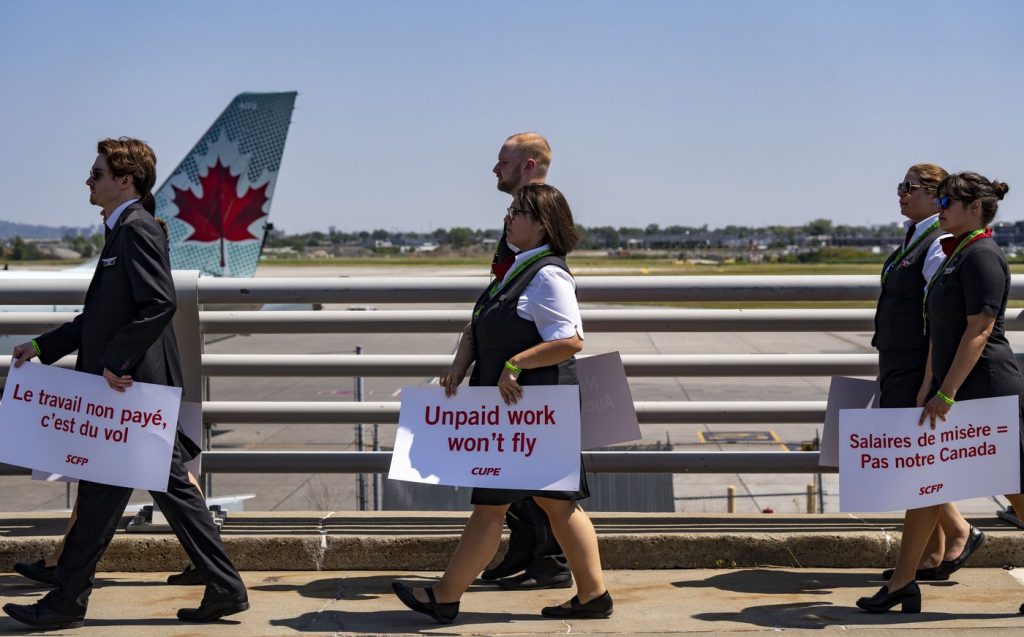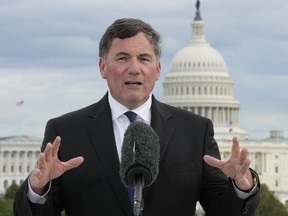Business
Air Canada Strike Threat Could Transform Aviation Industry

Unpaid work issues have emerged as a significant point of contention in Air Canada’s ongoing labour negotiations, with potential ramifications extending beyond the airline itself. Ian Lee, an associate professor at Carleton University’s Sprott School of Business, suggests that a strike by flight attendants could lead to transformative changes within Canada’s entire aviation sector.
Flight attendants have raised concerns about working unpaid hours, which include essential responsibilities such as boarding, deplaning, and conducting safety checks. Lee highlights that public sentiment appears to be firmly against the notion of working for free. He commented on 1130 NewsRadio, stating, “I don’t think there’s very much support anywhere in the country for the idea of working for free.”
With a possible strike looming as early as Saturday morning, Lee believes it is plausible that the federal government may intervene. He speculated that the Canada Industrial Relations Board could compel workers to return to their duties while also committing to amend the Labour Standards Act. This amendment could prohibit unpaid work across the aviation industry.
Lee elaborated on the significance of such a move, indicating that it would send a strong message to all sectors. “If Ottawa does move to outlaw unpaid work in aviation, it could set a precedent that other industries will watch closely,” he stated. Yet he cautioned that legislation would primarily apply to domestic airlines, potentially placing Canadian carriers at a competitive disadvantage compared to international airlines that do not fall under Canadian jurisdiction.
As the situation develops, Air Canada has begun cancelling flights in anticipation of a work stoppage. The flight attendants’ union has rejected an arbitration proposal from the airline, signalling a commitment to pursue their demands.
Lee emphasized the straightforward nature of the airline industry regarding payment for work performed. He argued, “If you’re standing up there in the plane — it has come to a stop — and you’re no longer being paid, yet you’re still deplaning customers, I don’t think anybody can say you’re not on the job.”
The potential for disruption in air travel has raised concerns about the federal government’s involvement. Lee’s research suggests that past strikes in the transportation sector have prompted government intervention, and he doubts that an Air Canada strike would extend beyond a few days before the government steps in.
As the deadline approaches, the industry watches closely to see how this dispute unfolds and what implications it may have for the future of aviation in Canada.
-

 World3 months ago
World3 months agoScientists Unearth Ancient Antarctic Ice to Unlock Climate Secrets
-

 Entertainment3 months ago
Entertainment3 months agoTrump and McCormick to Announce $70 Billion Energy Investments
-

 Lifestyle3 months ago
Lifestyle3 months agoTransLink Launches Food Truck Program to Boost Revenue in Vancouver
-

 Science3 months ago
Science3 months agoFour Astronauts Return to Earth After International Space Station Mission
-

 Technology2 months ago
Technology2 months agoApple Notes Enhances Functionality with Markdown Support in macOS 26
-

 Top Stories1 week ago
Top Stories1 week agoUrgent Update: Fatal Crash on Highway 99 Claims Life of Pitt Meadows Man
-

 Sports3 months ago
Sports3 months agoSearch Underway for Missing Hunter Amid Hokkaido Bear Emergency
-

 Politics2 months ago
Politics2 months agoUkrainian Tennis Star Elina Svitolina Faces Death Threats Online
-

 Technology3 months ago
Technology3 months agoFrosthaven Launches Early Access on July 31, 2025
-

 Politics3 months ago
Politics3 months agoCarney Engages First Nations Leaders at Development Law Summit
-

 Entertainment3 months ago
Entertainment3 months agoCalgary Theatre Troupe Revives Magic at Winnipeg Fringe Festival
-

 Politics1 week ago
Politics1 week agoShutdown Reflects Democratic Struggles Amid Economic Concerns





















